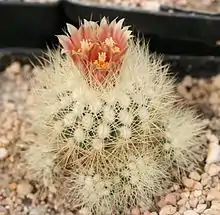| Acharagma roseanum | |
|---|---|
 | |
| Scientific classification | |
| Kingdom: | Plantae |
| Clade: | Tracheophytes |
| Clade: | Angiosperms |
| Clade: | Eudicots |
| Order: | Caryophyllales |
| Family: | Cactaceae |
| Subfamily: | Cactoideae |
| Genus: | Acharagma |
| Species: | A. roseanum |
| Binomial name | |
| Acharagma roseanum (Boed.) E.F.Anderson | |
| Synonyms | |
| |
Acharagma roseanum is a succulent cactus native to a small area of mountains of southeastern Coahuila and Nuevo León, Mexico. It grows on rocky limestone hills and xerophytic shrubland.[1] Its name is often misspelled as "Roseana".[2]
Description
Acharagma roseanum forms individual, small, soft bodied cacti that form clusters over time.[2] The plant's specific physical characteristics are: The stem is 4–6 cm (1.6–2.4 in) tall, 1.5–5 cm (0.59–1.97 in) wide with spines that are white-yellow to gold color. The warts stand in rows and are up to 0.3 centimeters long. The 4 to 6 yellow central spines are very similar to the marginal spines or are slightly curved and are 1 to 2 centimeters long. The 15 to 30 marginal spines are yellowish to brownish and 0.8 to 1.5 centimeters long. The flowers are pink to bronze with a dark reddish central stripe or cream flowers on the top of the stem, 1.5–2 cm (0.59–0.79 in) in diameter.[3]
Subspecies
| Image | Name | Description | Distribution |
|---|---|---|---|
 | Acharagma roseanum subsp. galeanense (Haugg) D.R.Hunt | It was first described in 1995 as Escobaria roseana subsp. galeanensis by Erich Haugg. David Richard Hunt introduced the species as a subspecies of Acharagma roseanum in 2002. The subspecies has a cylindrical body up to 6 centimeters high, the central thorns are indistinguishable from the marginal thorns, the number of thorns is 30 in total, cream-colored flowers up to 1.5 centimeters long. | Mexico (Coahuila) |
 | Acharagma roseanum subsp. roseanum | The nominate form has an ovoid body up to 4 centimeters high, 4 to 6 central thorns, about 15 marginal thorns, pink flowers up to 2 centimeters long. | Mexico (Nuevo León) |
Distribution
Acharagma roseanum is widespread in the Mexican states of Coahuila, Nuevo León and San Luis Potosí.
Taxonomy
The first description was made in 1928 as Echinocactus roseanus by Friedrich Bödeker.[4] The specific epithet roseanum honors the American botanist Joseph Nelson Rose. Edward Frederick Anderson placed the species in the genus Acharagma in 1999.
Synonyms are the following described species: Echinocactus roseanus Boed. (1928), Neoloydia roseanus (Boed.) F.M.Knuth (1936), Thelocactus roseanus (Boed.) W.T.Marshall (1941), Escobaria roseana (Boed.) Buxb. (1951), Coryphantha roseana (Boed.) Moran (1953) and Gymnocactus roseanus (Boed.) Glas & R.A.Foster (1970).
References
- 1 2 The IUCN Red List of Threatened Species (2013). "Acharagma roseana". IUCN Red List of Threatened Species. 2013: e.T152561A120742505. doi:10.2305/IUCN.UK.2017-3.RLTS.T152561A120742505.en. Retrieved 12 February 2022.
- 1 2 "Acharagma roseanum (Boed.) E.F.Anderson". Retrieved 13 February 2022.
- ↑ Anderson, Edward F.; Eggli, Urs (2005). Das grosse Kakteen-Lexikon (in German). Stuttgart (Hohenheim): Ulmer. p. 70–71. ISBN 3-8001-4573-1.
- ↑ "Au Cactus Francophone :". Au Cactus Francophone (in French). Retrieved 2023-10-29.
External links
 Media related to Acharagma roseanum at Wikimedia Commons
Media related to Acharagma roseanum at Wikimedia Commons Data related to Acharagma roseanum at Wikispecies
Data related to Acharagma roseanum at Wikispecies
